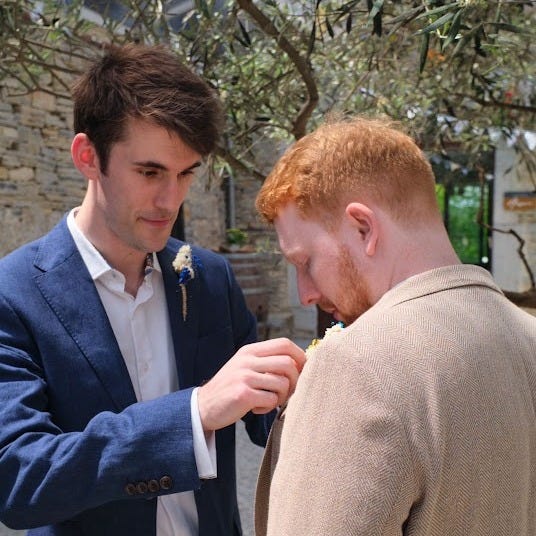Spare a thought for those of us old enough to be in peak wedding season. It’s lovely, it really is. There’s nothing more wholesome than watching two people you care very much about, commit themselves to each other for the rest of their lives. There is, however, a catch. And one with a very large price tag.
I have tried to think of ways to cheapen wedding attendance without cheapening the spirit, and it is deeply difficult.
Last year, I organised a stag do as Best Man for a very close friend. I was honoured. The groom could not have been more laid back, or more insistent that he wanted something with the lowest feasible cost so that all of his close friends – even those living abroad – could come.
Cue me and my co-best man M (‘the Best People’, if you will) assessing how many blow-up beds we could comfortably get on the floor of M’s Newcastle flat, and wondering how long you could conceivably ask guests to play pool. Even then, with M’s sterling work on fiscal control (the man is not a project manager by trade, but by God does he know his way around a spreadsheet), I still found myself scrapping around to save a couple of hundred quid in the weeks leading up to the weekend. Despite our best efforts, trains are expensive and eating out is hard to avoid.
I’m more fortunate than another friend, who is paying a whopping £800 to attend a hen do this summer. The poor girl has been press ganged into paying for a boat trip in a foreign country the morning after a big night out (please keep her in your thoughts and prayers). How, in this economy, facing a recession, in a cost-of-living crisis, is anyone even *thinking* of asking their friends for that kind of money? More people than you think, it turns out - the average hen/ stag weekend now costs £779 per person.
The average savings for someone aged 25 – 34 are around £3,544.16, Does that mean my friend should be expected to hand over nearly a quarter of her life savings for somebody’s else’s – not even special day- but special month? It seems quite frankly absurd – and although you can say no to attending, it’s hard to find a way to refuse that won’t significantly alter your relationship with the newlyweds.
So, when costs suddenly spiral and one finds oneself somehow agreeing to spend £800 on a hen do where one is guaranteed to hate every single activity, who do we blame? The bride.
It’s easy to find the archetypal bridezilla – rewatching Love Sick our friends could name at least 5 girls we knew who were bound to behave like Helen at their weddings – berating the groom for not smiling enough in photos and hitting him with a bouquet for having a drink. And yet, something about the bridezilla doesn’t quite sit right with me – where, after all, is the male equivalent? I’ve heard of many a stag do which also hit near the £1k mark, and yet this is seen as laddish behaviour – giving your mate a good send off to his bachelor days – it’s never portrayed in the terms of unreasonableness or ‘control freak’ behaviour that the bridezilla’s is.
Part of me wonders if the bridezilla is in fact a monster of modern making. Years of Disney films where marriage is the apotheosis of the Princess’s life, seems to have had a lasting legacy in cementing marriage as the single most import day of your life. The average cost of a wedding is £25k – which is a horrible amount of money, and also one you’ll presumably be expected to pay around the same time you might be trying to put money aside for a house deposit or as some savings to start a family. It’s no wonder that the pressure to create the perfect day (and hen) do can be an unbearable amount of financial stress that leads the Bridezilla to feel entitled to claiming significant financial contributions from guests in other ways.
The bridezilla in fiction is also determined to wed her man – in a way often portrayed as comically desperate. A bridezilla avant la lettre might be Lydia in Pride and Prejudice, or later - Monica in friends. But there not a tragedy in the way in which women, desperate to have a child and limited by their own biology, are ridiculed for trying to settle down. Meanwhile men, for whom time is of less importance, can mock them as they refuse to commit to their own long-term, long-distance low commitment casual girlfriend (to quote Ken in the Barbie film).
The bridezilla may also be responsible for 95% of all planning decisions, all the emotional labour of who to sit on which tables, and every minutiae of consideration about how to install an accessible ramp in the venue, and what the allergies of each guest may be.
The issue it seems is the laguna of empathy between the bridezilla – taught that her success as a woman is dependent on the man she marries and the wedding that is the social proof of this – and the rest of the wedding party – who find her obsessive behaviour frustrating. I remembered this quote about motherhood by Bonnie Burstow:
“Often father and daughter look down on mother (woman) together. They exchange meaningful glances when she misses a point. They agree that she is not bright as they are, cannot reason as they do. This collusion does not save the daughter from the mother’s fate.”
― Bonnie Burstow, Radical Feminist Therapy: Working in the Context of Violence
We look at each other and nod in complicitly at we show contempt for the bridezilla – the woman who is demanding and difficult and the opposite of a chill girl – and yet we women won’t escape that fate, regardless of how low-maintenance our decisions about wedding flowers may be.
How then to square feminist empathy with economic inequality? This is not of course to justify the behaviour of the veritably insane – the women whose aggressively neurotic personalities cannot be blamed on the patriarchy. How then can we differentiate between the selfish and inconsiderate against the exhausted woman at the end of her tether and cracking under the pressure of patriarchal perfection?
My idea, my friends, is etiquette – what if there was a social norm? In the same way one assumes a mortgage can be four times one’s salary, what if we capped hen dos at 10% of the average annual savings for this age group. With a social norm of how much is acceptable one can separate a woman looking to make her hen weekend a success from one who is perhaps putting her interests’ so far above those of her friends and family that she is destined to lose them all before she takes her first step down the aisle. Social norms are wonderful things – it’s why people use bins instead of littering everywhere, and why you know you can go on a second date with a man who holds open a door for you. Can we not create some wedding etiquette for the 21st century – nothing that involves what plate to buy from the registry or what colours are appropriate to wear, but actual financial controls that stop the ignorant from veering into the insulting.

My plan would be this: the 10% savings rule must be broadcast far and wide – like seatbelt wearing ads from the 1980s! Public service information films with a mathematical formula of a fair price to pay. Adverts on the tube featuring happy smiling brides. Please, something, anything to prevent this insanity spreading any further.
I am a feminist and I despise the idea that women are made out to be crazy, bouquet wielding monsters when they get married – but it’s also hard to empathise with someone whose behaviour is so rooted in a disregard for economic inequality.
That way one could be sure of being a true feminist, and entirely entitled to say, when asked to pay £800 for a hen do, that quite frankly, the bride can shove her bouquet where the sun don’t shine.




